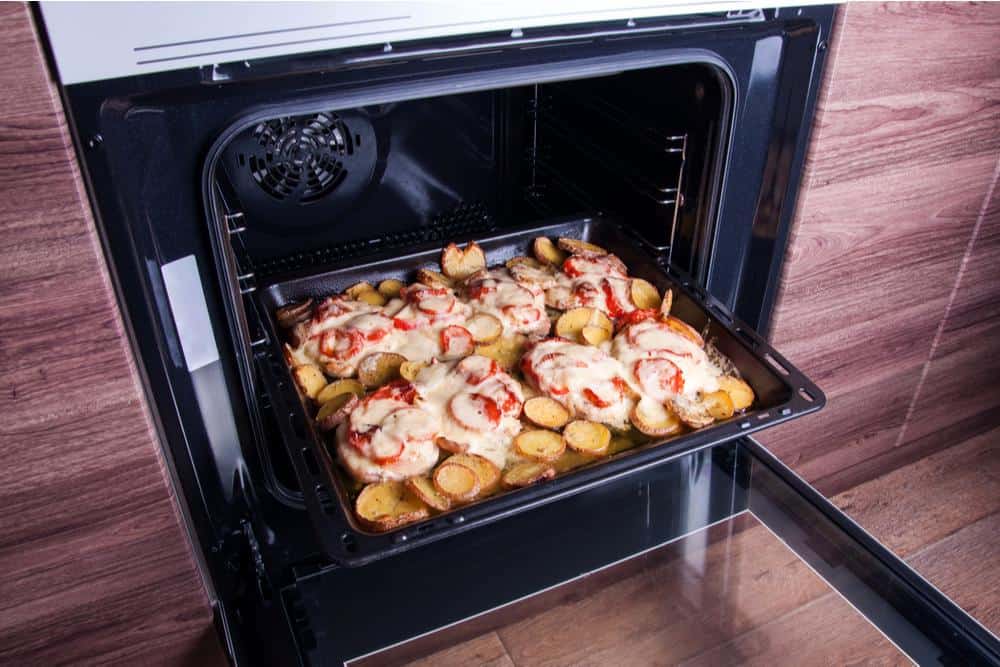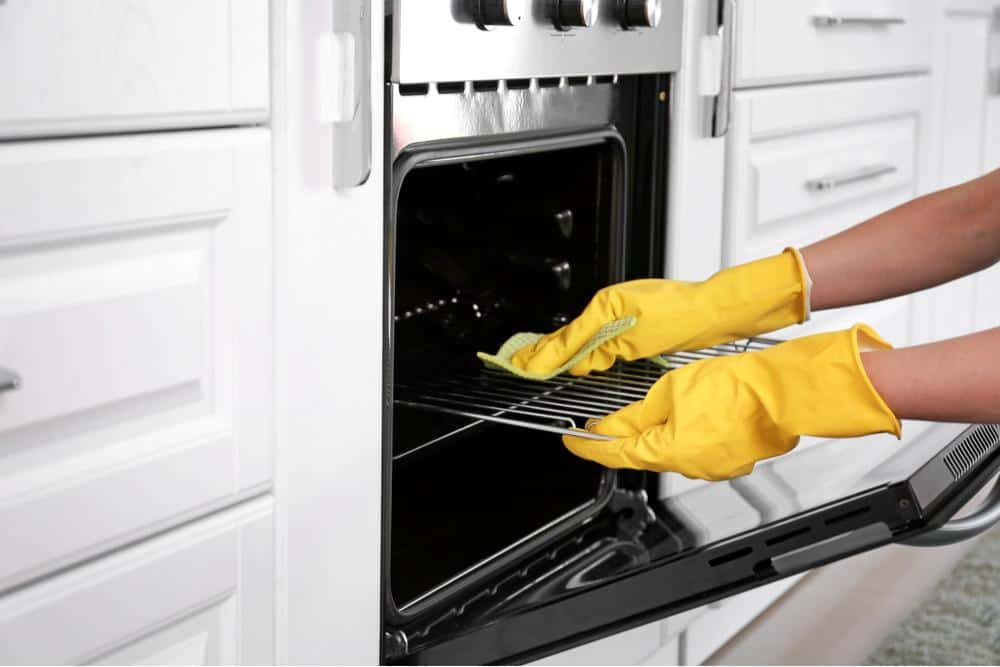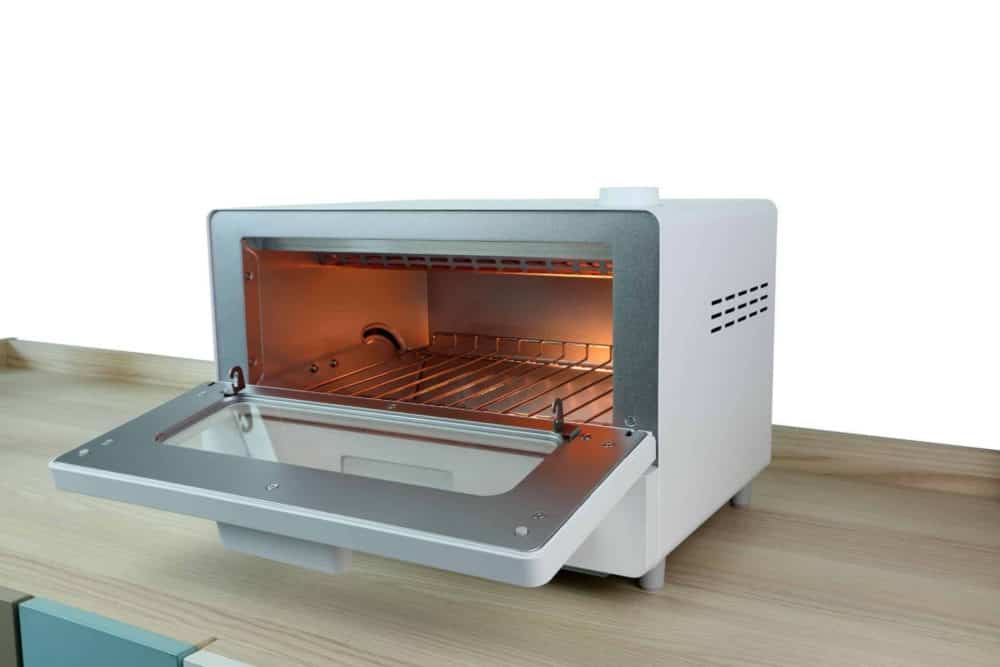According to the National Fire Protection Association, unattended cooking is the leading cause of home cooking fires globally, including fires started by leaving an oven on and unattended. The short answer to the question “Can I leave the oven on when I’m not home” is no, but it’s significant to know why this is a dangerous activity.
 Where do you think you’re going? Never leave the house with the oven on if you want your house to be there when you get back.
Where do you think you’re going? Never leave the house with the oven on if you want your house to be there when you get back.
Many people wonder if they can leave their oven on to go for a quick trip to the grocery store for a forgotten item or even overnight for a recipe that requires slow cooking. It’s no wonder that people question whether this is something that can be done safely.
The main issue with leaving an oven on is that a problem may arise while not being watched. If you’re out of the house, you have no way of handling the situation and must deal with the aftermath.
You may think that dangerous problems are uncommon, so your chances are low while you leave. However, oven issues are quite common, and calls to the fire department regarding cooking fires and similar issues spike around holidays such as Thanksgiving and Christmas.
We’ve gathered information provided by the leading sources on home fire prevention to help inform you on oven safety. In addition, we’ll answer some of the most common questions related to home cooking dangers and the issue of leaving the oven on.
It is important to note that most oven manufacturers include warnings against unattended oven use and leaving the oven on for a prolonged time. We’ll let you know why those warnings are in place and how you can best prepare yourself in the case of an oven fire.
It is always a bad idea to leave an oven unattended no matter the amount of time. You may think there’s no harm in taking a quick trip to the grocery store because the chances of anything happening during that time are low. But accidents are never planned, and there is no way of knowing what can happen while you’re gone.

This looks delicious. You need to stay home and monitor your cooking to minimize any potential fire dangers
If an issue happens while you are there, you can quickly take steps to mitigate damage. As an example, you'll have easy access to the fire extinguisher that you already have stored in your kitchen, right?
However, if you’re gone while a problem arises, your chances of mitigating the damage have all but disappeared and you may come home to a much larger problem than if you were present.
Here are some of the most prevalent dangers of leaving an oven unattended:
Oven fires can start for a variety of different reasons. Some of the reasons are food scraps that fall to the bottom of the oven, excess grease, or accidentally leaving things in the oven (such as oven mitts, rags, etc.).
Oven fires can also be caused by mechanical or electrical malfunctions in the oven. These issues can seemingly come out of nowhere, so it’s essential that after a malfunction causes a fire, you should have a professional kitchen appliance repairman inspect and service the oven. Never use a malfunctioned oven until after it has been inspected and repaired.
Carbon monoxide (CO) is a lethal and highly toxic gas, so even a short exposure is risky. Gas ovens run the risk of releasing excessive carbon monoxide . This is very dangerous and can lead to CO poisoning. Carbon monoxide can form when there isn’t enough oxygen to allow natural gas to burn completely. This results in deadly CO buildup.
Leaving a gas oven on for an extended time poses a greater risk of building carbon monoxide and increases the potential for carbon monoxide poisoning. You can help prevent carbon monoxide exposure and poisoning by purchasing a carbon monoxide detector (also called a CO detector) or ensuring your current CO detector is working.
Leaving a gas oven on and unattended is doubly risky when compared to an electric stove, as you risk carbon monoxide buildup and the potential for fire. If you leave your oven on and leave your house, you are not necessarily at greater risk. The problem is that because you aren’t present, you have no way of handling a problem if it does occur.
Unlike a gas stove, electric ovens do not burn fuel or use gas for energy, there is no risk of carbon monoxide poisoning. However, leaving your electric oven on when not at home still poses a large risk.. The heating element can still reach a very high temperature which poses a significant fire risk. Excess food residue can be ignited by this extremely high heat.
Oven fires can be dealt with if noticed immediately but can become significant issues if left to grow.
There are many easy steps you can take to try your best to prevent oven fires. The important thing is to remember the things that cause oven fires, which are excess grease and unnecessary objects.
Here are the best steps you can take to prevent oven fires:

Keep your oven clean and remove all built up food residue to lessen the chance of fire
The United States Fire Administration provides a helpful pictograph that you can use to remember the steps to dealing with an oven fire if you are faced with one.
Your most important thing to remember when faced with an oven fire is to KEEP THE OVEN DOOR CLOSED. If you notice the fire while opening the oven door, immediately close it. If you see the fire through the closed door of the oven, do not open it to check and keep the door closed.
If you closed the oven door and the fire was small enough that it has already gone out (closing the door removes the excess oxygen that fuels the fire), you can open the windows. This helps get any smoke out of the room.
If you closed the oven door and it is not going out, leave your house immediately and call 911. If you first notice the fire and the flames are big enough that they are escaping the oven, you should also leave your house immediately and call 911.
The following are frequently asked questions about oven safety. Please note that you shouldn’t leave any gas appliance or electric appliance that generates heat on unattended. This applies to other cooking appliances like your air fryer - as well as the space heater in your family room. Both can present a significant fire hazard and shouldn’t be left alone while in operation.
If you search your specific make and model of your oven, you will most likely be able to find the specific manufacturer recommendations for time. However, there’s no need to worry about long periods with your oven (as long as the temperature isn’t very high) as long as you pay attention.
It’s typical for ovens to run for long periods for recipes like turkey or bread, so they aim to withstand these long cook times. You should avoid long cook times when the oven will be unattended, such as overnight or while you are out of the house.
If your cooking requires an especially long cook time in the oven, just make sure to check on it periodically to ensure there are no issues. This is a great routine to keep in mind anyways as checking on your meal ensures that it’s cooking correctly and will turn out well.
Some ovens do have automatic shut-offs! Most popular oven brands have options for newer kitchen appliances with digital timer shut-offs. Some ovens have automatic shut-offs where the oven will shut off on its own after a set number of hours. Others have a digital timer option, where you can set a timer where the oven will shut off at a specific time.
Only some ovens come with automatic shut-off options and these are typically newer models.
If you're thinking about leaving the house because your oven will automatically shut off - don't. You shouldn't rely on your oven to automatically shut off.
The first step is to turn the oven off immediately. It’s a part of human nature to be forgetful, so you may wake up only to realize you or someone else in your house accidentally left the oven on overnight. The next is to try to remember this experience for the next time and always check and ensure that you have turned the oven off immediately after using it.
If you use a gas oven, check your carbon monoxide detector and ensure there are no alerts. If you don’t have a carbon monoxide detector, it’s good to purchase one, especially if you have gas appliances.
Toaster ovens pose as much risk for kitchen fires as regular ovens when it comes to fire safety - and you should not leave the house with the toaster oven on.
Toaster ovens are often times near many flammable materials on a kitchen counter. They're frequently located under wooden cabinets and often times next to an oven mitt or two, dish towels, cookbooks and other items which could easily ignite and lead to a major house fire.
Make sure your counters are clear and you don't leave the house with your toaster oven on.
An electric oven does not release carbon monoxide. Because electric ovens do not use combustion as a source of energy, there is no risk of carbon monoxide release or buildup, because there is no carbon monoxide involved in the process.
That said, an electric oven is still at the same risk of catching fire as their gas counterparts, so keep that in mind. Electric ovens also pose the risk of electrical malfunction, which can cause the inside of the oven to catch fire.
Oven fires can start from many different sources, some preventable and some not. The preventable ones are the ones you should keep in mind, as there are steps you can take to try and make sure they don’t happen.
Stray food scraps often start preventable oven fires in the oven and excess grease from cooking foods that use a lot of fat and oil. Both issues can be prevented by regularly cleaning your oven and ensuring there are no stray food scraps at the bottom of your oven before you cook something.
Sometimes fires start because things not meant to go in the oven are accidentally left there. These are usually oven mitts or dish towels and rags. Remember to never leave anything unnecessary in your oven, whether you’re using it or not at the moment.
Malfunctions in your oven can happen at any time and are not caused by issues on your part. However, if there is a malfunction in your oven, make sure you contact a professional kitchen appliance repairman and have them inspect it.

Your toaster oven should be kept clean and counters should be free of clutter to help reduce risk of kitchen fire
